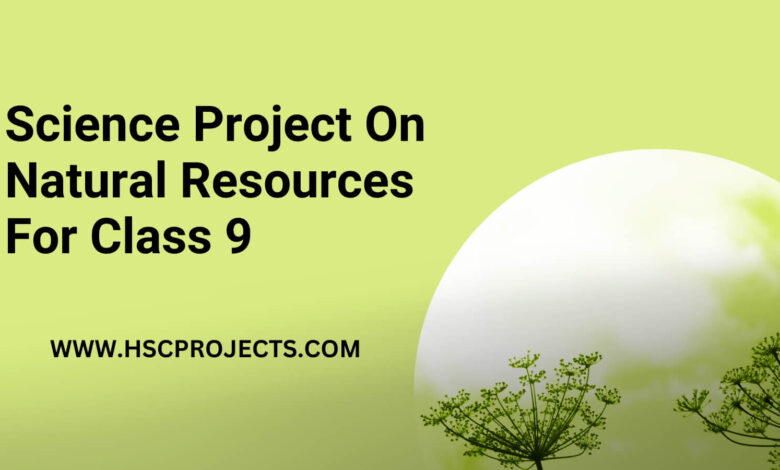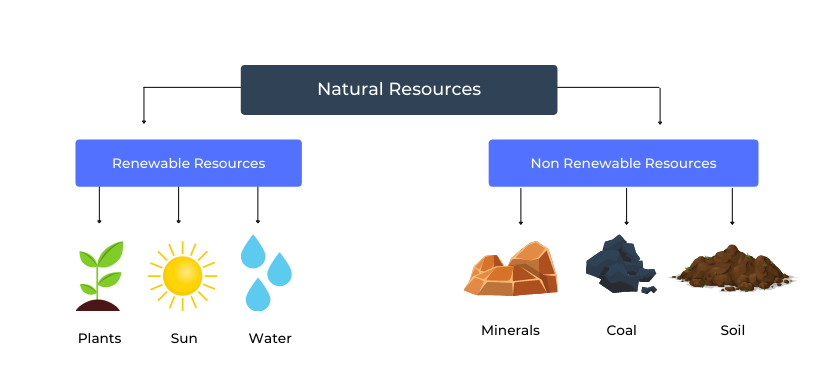
Science Project On Natural Resources For Class 9
Acknowledgment
I want to sincerely thank everyone who has assisted me in finishing my project on natural resources. First and foremost, I want to express my gratitude to my teacher for providing me with the chance to study and write about this significant subject.
I also want to express my gratitude to my parents for their unwavering support and inspiration during my academic career. They have been a tremendous source of inspiration and advice for me.
Last but not least, I want to thank my friends and classmates for their assistance and criticism during the research and writing process. Their advice and thoughts have been very beneficial in raising the calibre of this endeavour.
Once more, I would want to express my gratitude to everyone who helped finish our study on natural resources.
Preface
The existence and welfare of humans and other living things depend on natural resources. Everything we require for survival—from the oxygen we breathe to the water we drink, from the food we eat to the materials we use for our homes and clothing—is derived from the earth’s natural resources.
However, we are putting a greater strain on these resources as the world’s population continues to rise and as our economies develop. Our natural resources’ availability and sustainability are being threatened by environmental problems such as climate change, deforestation, pollution, overfishing, and others.
The significance of natural resources, the threats to our planet’s resources, and some of the actions we can take to safeguard and maintain these priceless resources for future generations will all be covered in this project. We want to inspire action to build a more sustainable future by raising awareness of the pressing need to solve these problems through our research and analysis.
Introduction
Natural resources are the earth’s raw materials and constituent parts that are vital to human survival and the well-being of all other living things. These resources include, among others, the air, water, soil, minerals, forests, and wildlife.
The accessibility and sustainability of these resources are more and more crucial as the global population and economies expand. We must effectively manage and utilise the limited natural resources we have given the rising demand and restricted supply.
However, a number of environmental problems, such as climate change, deforestation, pollution, overfishing, and habitat destruction are putting our planet’s natural resources in danger. These problems endanger not just the environment but also the health and welfare of people.
Natural Resource Categories

Renewable Resources: Resources that can regenerate themselves over time include sunlight, wind, water, and wood. Because they can be used without becoming completely depleted, these resources are typically regarded as sustainable.
Non-Renewable Resources: Non-renewable resources are limited and cannot be renewed. Examples include minerals like iron, copper, and gold, as well as fossil fuels like coal, natural gas, and oil. These resources cannot be replenished after they are used up.
Inexhaustible Resources: Resources that are basically unending, such as solar and geothermal energy, are known as inexhaustible resources. Although these resources do have some limitations, they are not likely to run out anytime soon.
Biotic Resources: Resources derived from living things, such as those found in forests, fish, and animals, are referred to as biotic resources. These resources are crucial for economic growth and human life, but in order to assure their long-term availability, they must be handled sustainably.
Abiotic Resources: Resources that are not produced by living organisms, such as minerals, water, and air, are referred to as abiotic resources. These resources must be maintained responsibly to prevent depletion and contamination because they are crucial for human survival and economic growth.
We can better manage and utilise natural resources to maintain their sustainability and long-term availability by knowing the various forms of natural resources.
Amount Of Natural Resources Important
Economic Value: Natural resources are crucial for economic growth since they supply the industries‘ raw materials and support the creation of jobs. Governments and regional communities profit from the mining and processing of natural resources.
Environmental Value: Natural resources are essential parts of our planet’s ecosystem because they promote biodiversity and provide habitats for animals. They are essential for controlling the temperature, water cycle, and cycling of nutrients on Earth.
Social Value: Natural resources offer the essentials for life, including food, water, and shelter. Additionally, they support leisure pursuits like tourism and outdoor recreation.
National Security: Natural resources are crucial to maintaining national security because they provide the energy, minerals, and other key elements required for military and defence operations.
Human Health: Clean air and water, wholesome food, and natural medicines are all provided by natural resources, which are crucial for maintaining human health and wellbeing.
It is impossible to exaggerate the value of natural resources. They are vital to the existence and well-being of humans and other living things, and the sustainability of their management is key to our future.
Natural Resource Depletion
Natural resource depletion is a significant issue that imperils both the health of humans and other living things as well as the viability of our planet’s ecosystems. The following are some of the primary reasons of resource depletion:
Mismanagement: Natural resources, particularly non-renewable resources like fossil fuels, have been overused and poorly managed, which has resulted in their depletion. Additionally, a lot of resources are depleted because they are used up faster than they can be replenished.
Pollution: Many natural resources, such as air and water, have been degraded by pollution from industries, agriculture, and other human activities, rendering them unusable or hazardous to human health and the environment.
Destruction of Habitats: The loss of biodiversity and the depletion of numerous resources, including timber and wildlife, have been brought on by the destruction of habitats, notably forests.
Climate Change: The availability of water and agricultural productivity are two examples of how climate change is altering natural resources, which may result in their depletion or degradation.
Unsustainable Consumption: Global natural resource depletion is a result of unsustainable consumption practises, particularly in industrialised nations.
Natural resource depletion has detrimental effects on human and other living things’ health as well as the ecosystems of our world. In order to ensure that these resources are available for future generations, it is crucial that we take action to manage and use them sustainably.
Natural Resource Preservation

The appropriate management and use of natural resources is referred to as conservation in order to guarantee their persistence for future generations. Among the most important measures we may take to protect natural resources are:
Reusing and recycling items can assist to conserve natural resources and cut down on waste by reducing the amount of natural resources we utilise.
Sustainable Agriculture: Crop rotation and organic farming are examples of sustainable agricultural practises that can help to preserve soil and water resources.
Sustainable Forestry: By using techniques like selective logging and regeneration, one may preserve timber supplies and advance biodiversity.
Renewable Energy: Increased use of renewable energy can lessen our reliance on non-renewable resources and encourage sustainability. Examples of such renewable energy sources include solar and wind power.
Pollution Control: Pollution control can aid in the preservation of natural resources like air and water by lowering the pollution produced by businesses and other human activities.
Education and Awareness: Raising public awareness of the value of natural resources and the need to protect them can support their sustainable management and use.
The long-term sustainability of our planet’s ecosystems and the health of humans and other living things depend on the conservation of natural resources. We can contribute to ensuring that these resources are accessible for future generations to enjoy by adopting sustainable practises, raising awareness of the issue, and encouraging education.
Natural Resources Examples

Water is a critical natural resource for human survival, agriculture, and many other sectors.
Another crucial natural resource is air, which contributes to climate regulation and supplies oxygen for both human and animal life.
Soil: Soil is a vital natural resource that promotes plant development and serves as the basis for many different businesses, including agriculture.
Fossil Fuels: Non-renewable natural resources utilised in the generation of energy include coal, oil, and natural gas.
Minerals: Natural resources like iron, copper, and gold are employed in a variety of industries, from electronics to building.
Timber: Timber is a naturally occurring resource that may be obtained from forests and utilised for a variety of tasks, including paper making and construction.
Animal: Wildlife is a natural resource that supports cultural and leisure activities like hunting and animal viewing while also providing ecological functions like pest control and pollination.
Renewable Energy Sources: Renewable energy sources are natural resources that are used to provide clean energy. Examples include solar, wind, and hydropower.
These are but a few instances of the numerous natural resources that are available and crucial to human existence and economic growth. In order to ensure that these resources are available for future generations, it is crucial that we manage and utilise them sustainably.
Conclusion And Prospects
Natural resources are crucial to the continued existence and welfare of humans and other living things. In addition to offering ecological services that support the ecosystems on our world, they also offer food, water, shelter, and energy. The sustainability of our world is now in jeopardy due to the overuse and poor management of natural resources, which has caused their degradation and depletion.
For natural resources to be available to future generations, they must be conserved. We can contribute to the preservation of these resources and the preservation of our planet’s ecosystems by implementing sustainable practises and encouraging awareness and education.
In order to manage and use natural resources sustainably in the future, it is crucial that we continue to develop and adopt sustainable practises. This entails encouraging the use of renewable energy sources, sustainable forestry and agricultural practises, and lowering pollution from businesses and other human endeavours. It also entails keeping up public awareness campaigns about the value of and need for protecting natural resources.
In conclusion, natural resources are essential to the ecosystems of our globe as well as the health of humans and other living things. For the benefit of both current and future generations, we must collaborate to sustainably manage and maintain these resources.
Certificate
This is to certify that I, [Your Name], a student of Class 9 at [Your School Name], have successfully completed the science project on “Natural Resources. ” The project was undertaken as part of my academic curriculum to explore and understand the significance of natural resources, their depletion, and the importance of conservation.
I would like to express my heartfelt gratitude to my teacher, [Teacher’s Name], for providing me with the opportunity to delve into this critical topic and expand my knowledge on the subject matter. Their guidance, encouragement, and valuable insights have been instrumental in the successful completion of this project.
I am also deeply thankful to my parents for their constant support and motivation throughout my academic journey. Their encouragement and belief in my abilities have been a constant source of inspiration.
Furthermore, I extend my appreciation to my friends and classmates for their assistance and constructive feedback during the research and writing process. Their input has been invaluable in enhancing the quality of this project.
I am thrilled to have worked on this project, as it has allowed me to understand the importance of natural resources, the threats they face, and the measures we can take to protect them. It is my hope that this project will raise awareness and inspire others to take action in preserving our planet’s precious resources for future generations.
Date: [Date]Place: [Your City] [Your Signature](Your Name)
In order to download the PDF, You must follow on Youtube. Once done, Click on Submit
Follow On YoutubeSubscribed? Click on Confirm
Download Science Project On Natural Resources For Class 9 PDF






